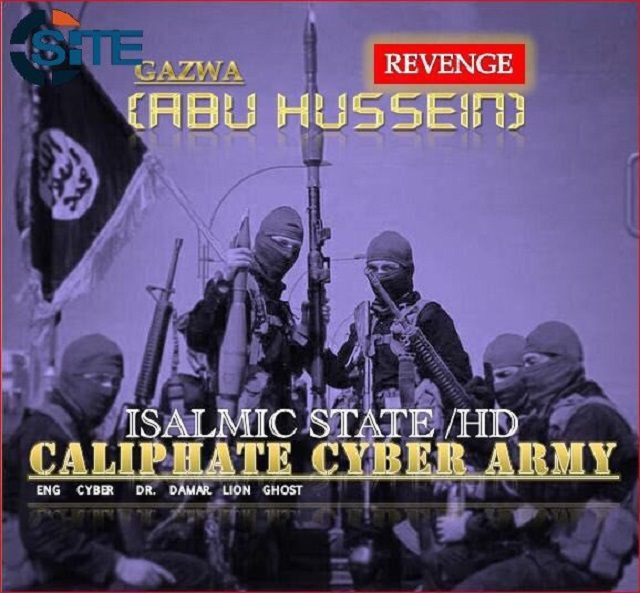Islamic State (ISIS/ISIL) hackers have vowed to take revenge against the United States for a drone strike last August that killed the jihadist group’s top hacker Junaid Hussain.
On Tuesday, the CyberCaliphate, a prominent ISIS-affiliated hacking group that is reportedly planning to hack Google, posted an image to its official account on the Telegram messaging app that included a pledge to avenge the slain top ISIS hacker.
The Hill received a screenshot of the post from the Middle East Media Research Institute (MEMRI).
The image features a group of ISIS jihadists holding rocket launchers. Superimposed over the top of the picture are the words “Revenge,” “Gazwa (military raid/battle),” and “Abu Hussein.” Over the bottom of the posting, the phrases “Islamic State/HD” and “Caliphate Cyber Army” appear.
Abu Hussein is a nom de guerre used by Junaid Hussain, who was killed in a U.S. drone strike last August.
“The extremist had been tied to a number of ISIS hacking incidents over the past few years and was believed to be the head of the CyberCaliphate,” reports The Hill. “Most prominently, Hussain was linked to the release of personal information on over 1,300 U.S. military and government employees.”
Hussain also “helped sharpen the terror group’s defense against Western surveillance and built hacking tools to penetrate computer systems,” helped ISIS leaders maintain secure online communication systems, and assisted the terrorist group in recruiting “lone wolf” operatives across the world, including the jihadists killed while trying to attack the Mohammed Art Exhibit in Garland, Texas, reported the Wall Street Journal (WSJ) back in August.
Despite its pledge to avenge the execution of Hussain, ISIS did not include a specific threat or target in the posted image.
“Steven Stalinsky, executive director of MEMRI, said the last few CyberCaliphate posts vowing similar revenge did not lead to significant hacks or data leaks. In some instances, ISIS hackers simply re-posted information on U.S. officials they had already leaked,” reports The Hill.
“Regardless, ISIS hackers have gained attention over the last year for defacing media outlets’ websites, releasing U.S. military members’ personal details, taking over high-profile Twitter accounts, even stealing credit card data,” it adds. “In response, the Pentagon may be increasingly targeting these tech-savvy members.”
In coordination with Malaysian authorities, U.S. officials arrested Ardit Ferizi, a Kosovo native, two months after killing the top ISIS hacker last August.
Ferizi reportedly leaked the data on U.S. service members to Hussain. He is being held prisoner in the United States on charges of terrorism and hacking, facing a maximum penalty of 35 years behind bars if convicted.
“As alleged, Ardit Ferizi is a terrorist hacker who provided material support to ISIL by stealing the personally identifiable information of U.S. service members and federal employees and providing it to ISIL for use against those employees,” said Assistant U.S. Attorney General Carlin said in a press release last October. “This case is a first of its kind and, with these charges, we seek to hold Ferizi accountable for his theft of this information and his role in ISIL’s targeting of U.S. government employees. This arrest demonstrates our resolve to confront and disrupt ISIL’s efforts to target Americans, in whatever form and wherever they occur.”
Siful Haque Sujan, another ISIS hacker, was taken out by a U.S. drone strike early last month. He was not as well known as Hussain or Ferizi.
“While experts agree that ISIS’s hacking skills remain rudimentary, the group’s digital vandalism has boosted the terrorist organization’s robust online propaganda and recruitment efforts,” notes The Hill. “U.S. officials have struggled to combat this campaign with its own digital propaganda.”

COMMENTS
Please let us know if you're having issues with commenting.